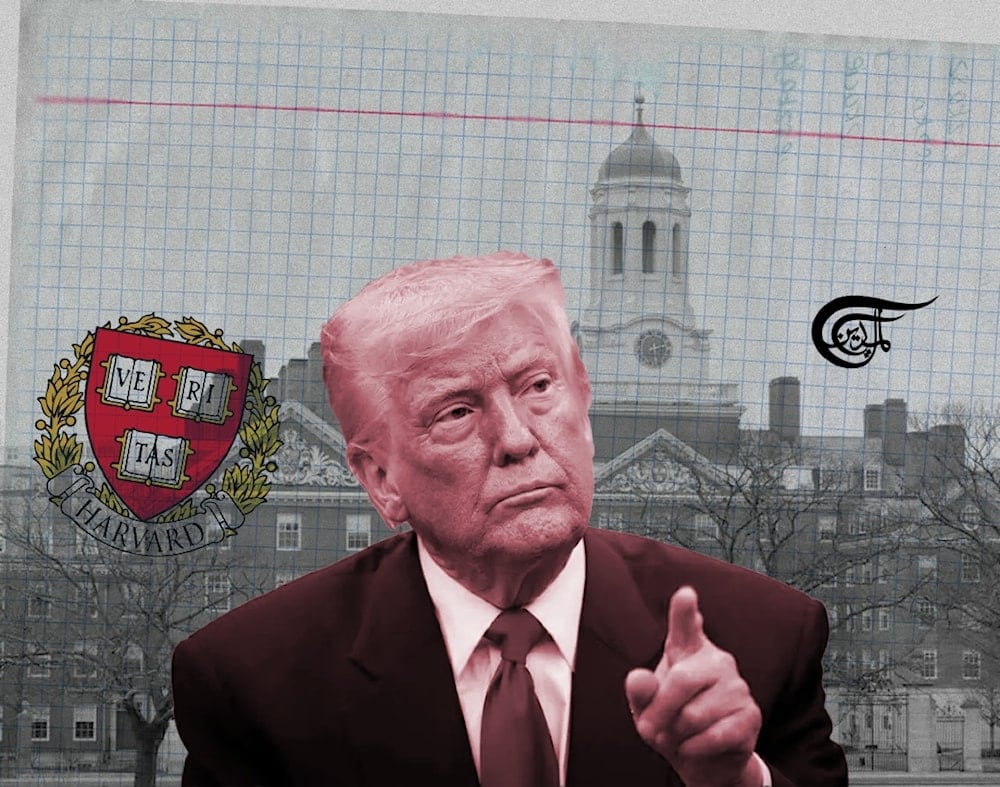Why Trump’s tussle with Harvard University falls short
Unlike the Trump administration, Harvard is reacting in its interests and is likely to step up its self-defence as foreign students and their supporters face a new alarm.
-

The Trump administration is facing a hefty legal battle (Illustrated by Mahdi Rtail; Al Mayadeen Englsh)
After a prolonged and increasingly aggressive period of tensions between the Trump administration and Harvard University, all signs point to more complicated legal challenges for the White House. The latest challenge came as a US federal judge suspended Trump’s push to block the esteemed institution from enrolling foreign students, a move widely seen as a discriminatory tactic that pulls Chinese students, alongside other overseas students, into a hostile purge. Trump’s block, challenged as unconstitutional, demonstrates the importance of Harvard University’s resistance on a range of levels. Here are key considerations that merit attention.
Begin with the nature of defiance on display. Trump’s administration has made highly controversial claims about the institute cultivating violence and antisemitism. These allegations merit considerable scrutiny because antisemitism has been used as a tool to justify crackdowns against brave voices standing up for Palestinian freedoms or speaking out against a raging Israeli genocide. Antisemitism, as employed by the Trump administration, has thus offered a pretext to threaten universities as the administration sees fit, and a pattern of resistance is apparent across many US universities, not just Harvard.
Therefore, a rationale driven by these allegations has little relation with the actual facts on the ground: Trump is actively pushing to take out foreign students because he wants the target universities to do as his administration sees fit. Those who comply with initial administration demands may not have a target on their back at all. But in Harvard’s case, its apparent refusal to comply with federal oversight pertaining to admissions and hiring has contributed to increased scrutiny from the center.
But desperation may not cut it for Trump. Threats to review $9 billion in government funding, alongside a freeze on several grants and scores of formal contracts, indicate a lack of central objective. Efforts are more focused on taking apart the academic prestige and inner workings of a leading global institution. These academic merits – largely lost on the Trump administration – point to a broader attack on values of academic freedom and foreign student participation that have also become the lifeblood of America over the past years. Trump’s repeated failures to tailor his foreign student offensive to the legal underpinnings of the US system suggest that the president in charge poses an even graver threat to US democracy than one initially imagined.
It must also be understood that more humiliation could be on its way for Trump. His style of governance puts a premium on forcing compliance with policy targets in his administration, reflective of his transactional approach to interest-settling. But that approach could face future limits as all eyes are set on a May 29 hearing that could increase scrutiny of Trump’s discriminatory actions. The fundamental contrast between Trump and Harvard is this: the latter actually has a track record of engaging with scores of nationals from foreign countries, factoring actions on diversity, and taking some degree of responsibility for the actions, interests, and protections of its student body.
Recent developments have also shown an encouraging record of aligning its stated positions against the Trump administration’s campaign with key laws, including the US civil rights law. Trump, on the other hand, appears to be shooting from the hip as he moves from putting a racial context on the fight with Harvard, evidenced by allegations of collusion between Harvard and the Communist Party of China (CPC). This line of argument has been busted in the past: look no further than the years of Trump’s Secretary of State Mike Pompeo, who upped the ante on Chinese influence operation claims and often used these as a pretext to push for escalated hostilities with Beijing. Harvard is also facing an administration that has put a racial touch to a global pandemic, given Trump’s past push to label the COVID-19 virus as a “China virus", creating a climate of disinformation with little benefit to fact or reason.
These understandings are important because the Trump administration is facing a hefty legal battle, following proactive action by the federal judge to block its action against foreign student enrollment. These are signs that the battle could escalate further, given the fact that the Trump administration is also focused on barring Harvard from hosting overseas students. A multiplicity of targets – without a single rationale – suggests Trump is pushing for more bark and less bite. By presenting a composite of antisemitism, foreign student discrimination, Chinese influence operations, and condemnable allegations of so-called facilitated violence, Trump effectively makes the job easier for Harvard to narrow down its legal counterattack and take the administration to task.
Unlike the Trump administration, Harvard is reacting in its interests and is likely to step up its self-defence as foreign students and their supporters face a new alarm. For Trump, the tragedy is unmistakable: he cannot have US institutions, despite their shortcomings, right in his pocket.

 Hannan Hussain
Hannan Hussain
 5 Min Read
5 Min Read











